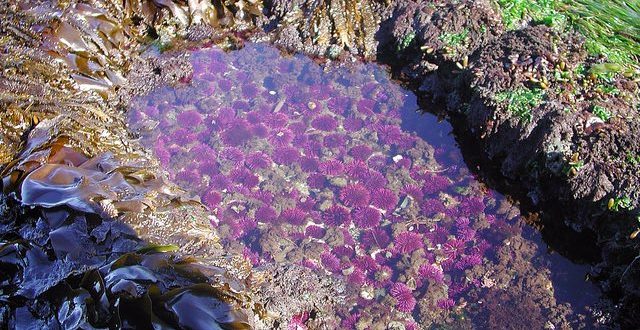A three-year survey of the California Current System along the West Coast of the United States found persistent, highly acidified water throughout this ecologically critical nearshore habitat, with “hotspots” of pH measurements as low as any oceanic surface waters in the world.
The researchers say that conditions will continue to worsen because the atmospheric carbon dioxide primarily to blame for this increase in acidification has been rising substantially in recent years.
One piece of good news came out of the study, which was published this week in Nature Scientific Reports. There are “refuges” of more moderate pH environments that could become havens for some marine organisms to escape more highly acidified waters, and which could be used as a resource for ecosystem management.
“The threat of ocean acidification is global and though it sometimes seems far away, it is happening here right now on the West Coast of the United States and those waters are already hitting our beaches,” said Francis Chan, a marine ecologist at Oregon State University and lead author on the study.
“The West Coast is very vulnerable. Ten years ago, we were focusing on the tropics with their coral reefs as the place most likely affected by ocean acidification. But the California Current System is getting hit with acidification earlier and more drastically than other locations around the world.”
A team of researchers developed a network of sensors to measure ocean acidification over a three-year period along more than 600 miles of the West Coast. The team observed near-shore pH levels that fell well below the global mean pH of 8.1 for the surface ocean, and reached as low as 7.4 at the most acidified sites, which is among the lowest recorded values ever observed in surface waters.
The lower the pH level, the higher the acidity. Previous studies have documented a global decrease of 0.11 pH units in surface ocean waters since the beginning of the Industrial Revolution. Like the Richter scale, the pH scale in logarithmic, so that a 0.11 pH unit decrease represents an increase in acidity of approximately 30 percent.
Highly acidified ocean water is potentially dangerous because many organisms are very sensitive to changes in pH. Chan said negative impacts already are occurring in the California Current System, where planktonic pteropods – or small swimming snails – were documented with severe shell dissolution.
“This is about more than the loss of small snails,” said Richard Feely, senior scientist with the National Oceanic and Atmospheric Administration’s Pacific Marine Environmental Laboratory. “These pteropods are an important food source for herring, salmon and black cod, among other fish. They also may be the proverbial ‘canary in the coal mine’ signifying potential risk for other species, including Dungeness crabs, oysters, mussels, and many organisms that live in tidepools or other near-shore habitats.”
Previous studies at OSU have chronicled the impact of acidified water on the Northwest oyster industry.
Chan said the team’s observations, which included a broad-scale ocean acidification survey via ship by NOAA, did not vary significantly over the three years – even with different conditions, including a moderate El Niño event.
“The highly acidified water was remarkably persistent over the three years,” Chan said. “Hotspots stayed as hotspots, and refuges stayed as refuges. This highly acidified water is not in the middle of the Pacific Ocean; it is right off our shore. Fortunately, there are swaths of water that are more moderate in acidity and those should be our focus for developing adaptation strategies.”
The researchers say there needs to be a focus on lowering stressors to the environment, such as maintaining healthy kelp beds and sea grasses, which many believe can partially mitigate the effects of increasing acidity.
Further, the moderately acidified refuge areas can be strategically used and managed, Chan pointed out.
“We probably have a hundred or more areas along the West Coast that are protected in one way or another, and we need to examine them more closely,” he said. “If we know how many of them are in highly acidified areas and how many are in refuge sites, we can use that information to better manage the risks that ocean acidification poses.”
Managing for resilience is a key, the researchers conclude.
“Even though we are seeing compromised chemistry in our ocean waters, we still have a comparably vibrant ecosystem,” Chan said. “Our first goal should be to not make things worse. No new stresses. Then we need to safeguard and promote resilience. How do we do that? One way is to manage for diversity, from ensuring multiple-age populations to maintaining deep gene pools.
“The greater the diversity, the better chance of improving the adaptability of our marine species.”
Chan, a faculty member in the College of Science at Oregon State University, was a member of the West Coast Ocean Acidification and Hypoxia Panel appointed by the governments of California, Oregon, Washington and British Columbia.
Agencies/Canadajournal
 Canada Journal – News of the World Articles and videos to bring you the biggest Canadian news stories from across the country every day
Canada Journal – News of the World Articles and videos to bring you the biggest Canadian news stories from across the country every day




Total B.S.! H2CO3 is unstable and wouldn’t stay in water even if you wanted it to. Leave your Coke bottle open and see the carbon dioxide disappear.
The acidified water of the article is caused by other, not greenhouse, gasses.